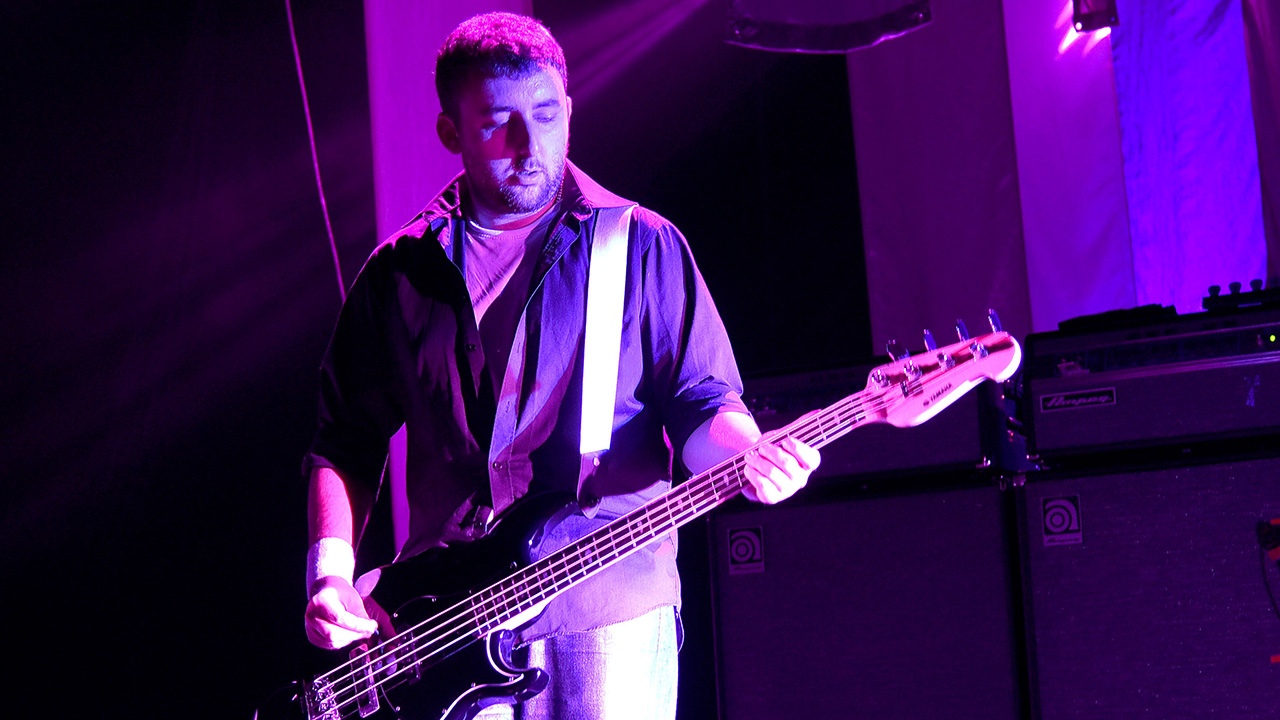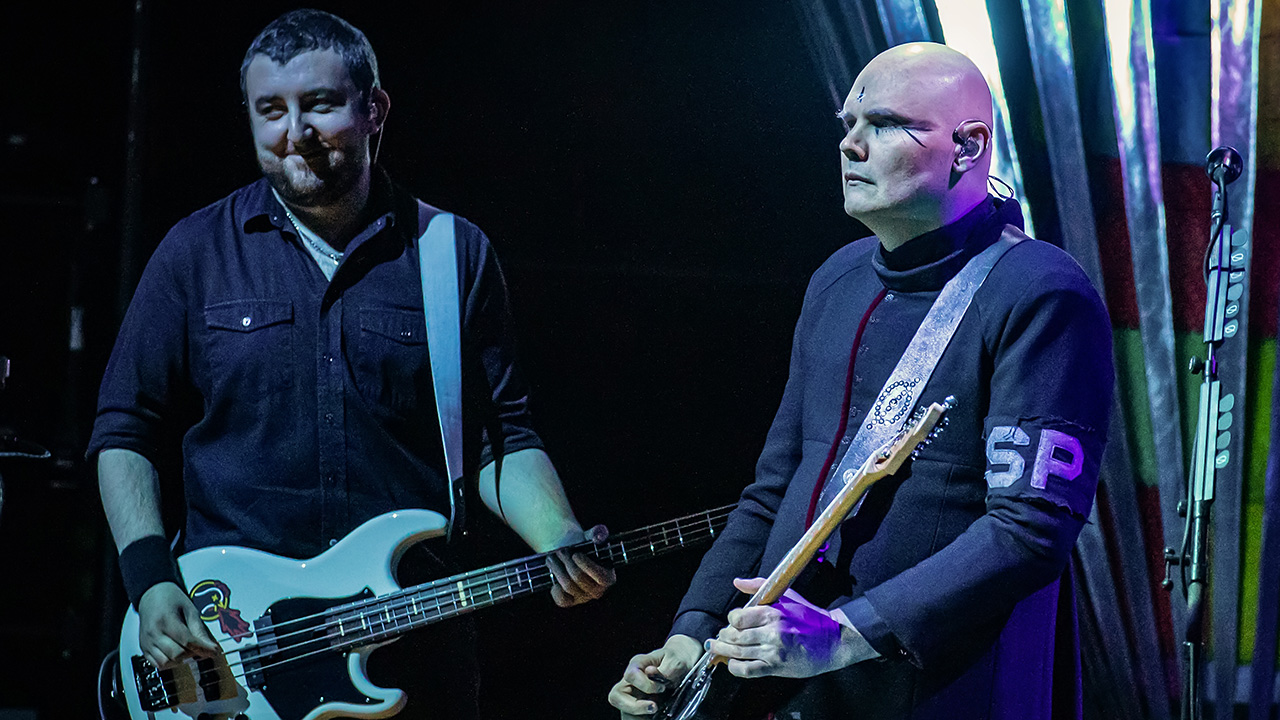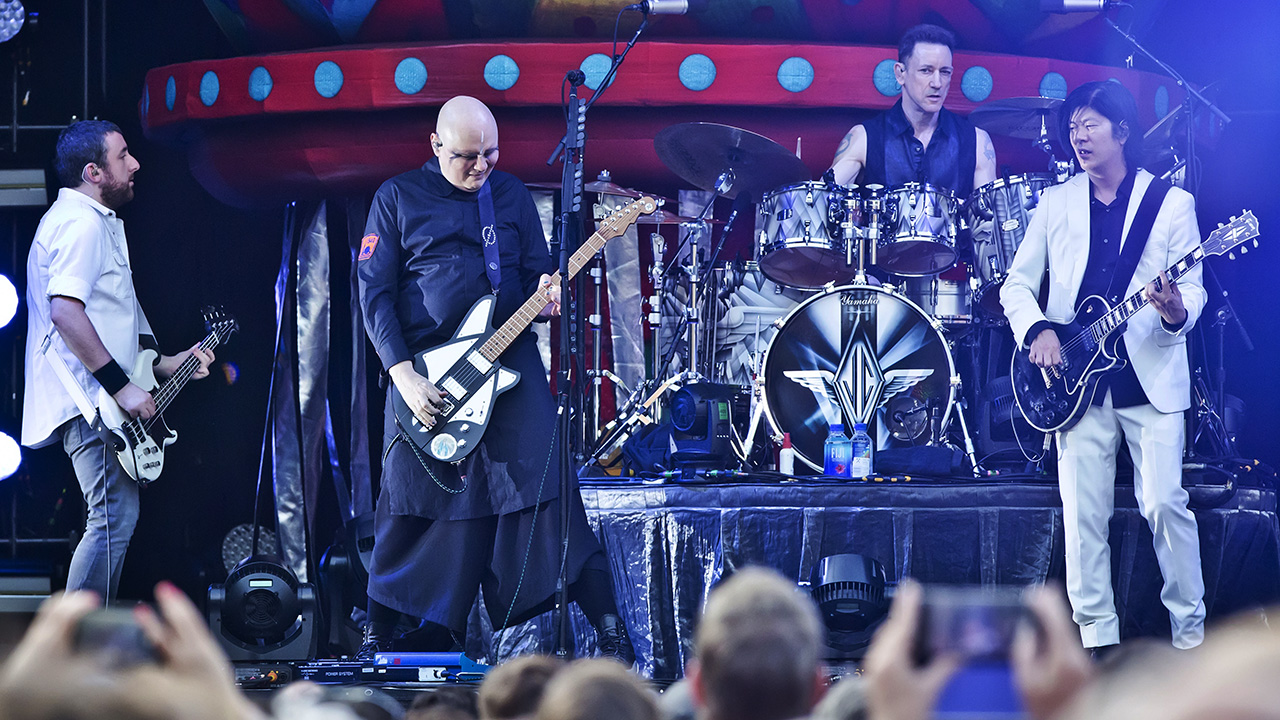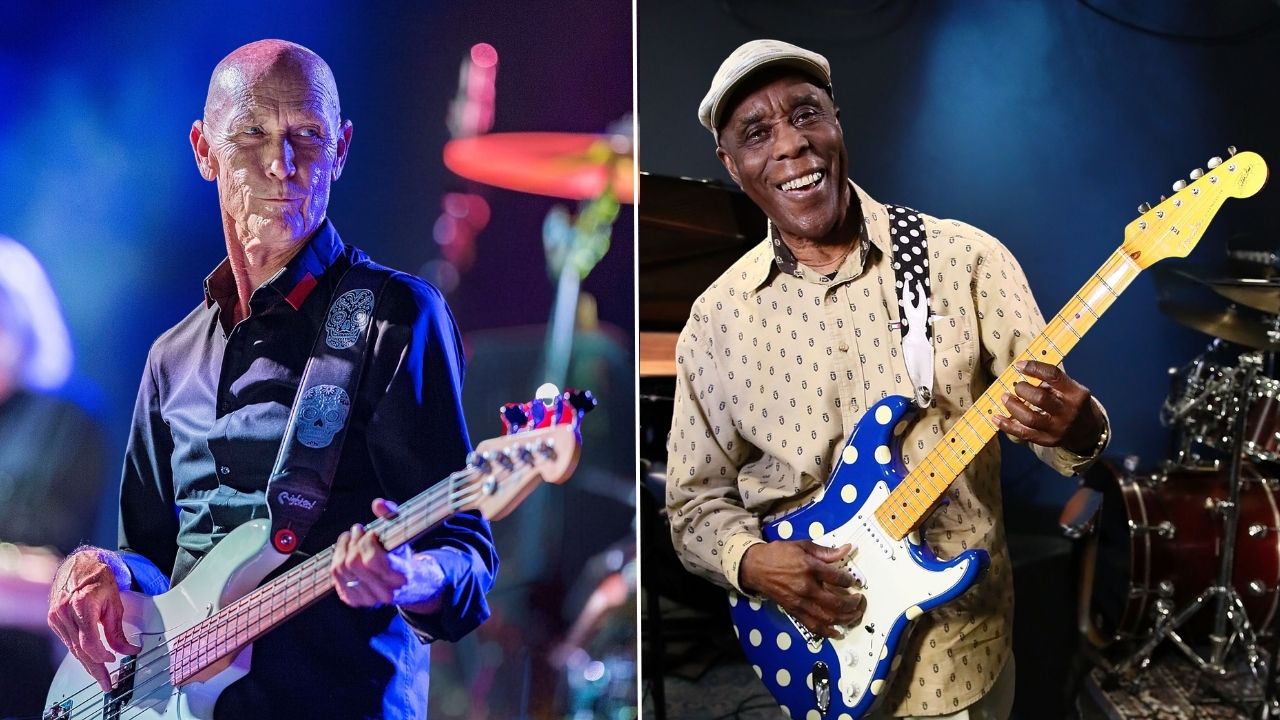“Before me it was classic Fender Jazz, but I showed up with a bunch of Yamaha basses. Billy Corgan was totally cool with that… it’s never been, ‘Do what I say or else’”: How Jack Bates splits his loyalties between Smashing Pumpkins and his dad, Peter Hook
Joy Division’s unique bassist wasn’t originally much of an influence to his son, who doesn’t use pedals with the Pumpkins – but needs to use ancient, unreliable ones with The Light

All the latest guitar news, interviews, lessons, reviews, deals and more, direct to your inbox!
You are now subscribed
Your newsletter sign-up was successful
Given that Jack Bates’ father is Peter Hook – one of the most distinctive bassists ever – it might seem as if Bates was destined to play bass, too.
But when asked if his dad was the reason he started, he tells Bass Player: “Partially, just because those instruments were around the house. It wasn’t a case of a 12-year-old me being like, ‘I want to be just like my dad.’ But after playing with him for years, he’s inspired me more and more.”
The apple certainly didn’t fall far from the tree – Bates not only took to the four-string like white on rice; but for the last 14 years, he’s been a member of Peter Hook and the Light.
While many may have feared going up on stage with Hook to dust off classic Joy Division songs originally sung by vocalist Ian Curtis, Bates took the gig with the same gusto that made his father's low-end work famous.
Bates proved so capable that when Billy Corgan was in search of someone to hold down the Smashing Pumpkins low end on tour, he called on the young gun to fill a spot once occupied by D'arcy Wretzky, Melissa Auf der Maur, Ginger Pooley, and Nicole Fiorentino.
“First and foremost, I was a massive fan,” Bates says. “When the Pumpkins started touring again in 2007, I was only 18; I’d been too young to see them in the ‘90s. I made sure to be at as many gigs as I could – you never know if a band will disappear again.”
In the nine years since, Bates has secured his position in Pumpkins lore beside Corgan, Jimmy Chamberlin, James Iha, and Jeff Schroeder. That cohesion was static until Schroeder departed in the fall of 2023 – leading the band to announce an open audition to replace him.
All the latest guitar news, interviews, lessons, reviews, deals and more, direct to your inbox!
I’ve been getting inundated with messages and people’s clips of them playing. I’m excited to see how it turns out
Bates laughs when asked about the process. “It’s crazy! I’ve been getting inundated with messages and people’s clips of them playing. I’m excited to see how it turns out. People are applying from the U.K., Brazil, France and everywhere. It’s amazing to see the excitement it’s caused.”
As the search continues, Bates isn’t laying back; he plans to use the time to attend to the role nearest his heart. “There’s nothing like the feeling of playing gigs with my dad, you know?
“I’ve grown to love that music, so I try to keep both gigs going, even though it’s difficult and sometimes clashes. I have gigs with my dad in April and May, so it should be fun.”

Peter Hook plays the bass like no other. After taking his sound in, how did you come upon your own?
“When you learn to play, you don’t think about what it sounds like, what effects, or what style you’re playing in. You sit and learn riffs in your bedroom – at least, that’s how it was for me. But by default, I’d go to my dad’s gigs and automatically start learning his riffs.
“When I got a bit older, I started learning about pedals and how to change and develop to become something more interesting. You always want to carve your own path. But since my first job as a professional was in his band, I thought, ‘Maybe it’s not such a bad idea for him to teach me after all.’”
Your dad aside, which other players influenced you?
“My number one is Eric Avery from Jane’s Addiction. The way his riffs drove those songs, to me, was very cool. Eric’s like my dad in that he’s got his own style – when I hear him play, even if it’s something I don’t know, I get the vibe that it’s him.

“Then there’s Carlos Dengler, who used to be in Interpol. I only saw him play once, but those basslines from those first few albums are incredible. I also like Lou Barlow from Dinosaur Jr. because of his different take on the bass. J. Mascis can take huge solos, and the rhythm section carries them.
“The last one is Mark Sandman from Morphine, who I got into over COVID. Mark built his own basses with just two strings and tuned them funnily while playing with a slide. He sounded like nothing else.”
You’ve carved out quite a niche over the years, but when you first joined your dad’s band, were you concerned about potentially living in his shadow?
“No, because it was the first gig I ever got, and it happened while studying Spanish at university. I was about to start year three, and out of the blue my dad said, ‘I want to do this one gig. I had some players, but they’ve been scared off by keyboard warriors.’

“Since there was another bass player in the house in me – even if I hadn't done anything yet – it just seemed natural for him to ask. That one gig became two gigs, and here we are 14 years later. Even though I’ve been in the Pumpkins for nine years I still go out and play gigs with my dad.”
Billy Corgan has gone with lesser-known players since reforming the band. With that in mind, how did you get the gig?
“Billy had a longstanding relationship with my dad going back to the ‘80s, and toured with him in 2001. That’s probably the first time I met him, but I don't remember – I was only 12. When my dad’s band would swing through Chicago, we’d get in touch to see if he wanted to see the show.
“In 2015 it came up that the Pumpkins needed a bassist, and Jeff called me to ask if I was interested. I was like, ‘No way!’ But it was real, and it's been a fantastic opportunity. I thought it would be just one tour, but I’m here doing it still.”

Most people think of the Pumpkins as guitar-centric, but there’s some incredible basslines too. What’s the secret to nailing the gig?
“For me it’s about locking in with the drums – and when your drummer is Jimmy Chamberlin it’s easy to do that. Playing with someone solid yet so amazingly talented and capable of virtuosity every night makes my job easier.
“So the first thing I do is lock in with Jimmy. After that, I let the guitars float on top. We’re very tight as a rhythm section due to the number of gigs we’ve played together. We know what each other will do before we do it – that only comes with time. You learn each others’ nuances.”
Billy Corgan wrote and recorded a lot of those basslines, so he’s the best person to give a new bassist hints and tips
Did Billy give you any tips when you joined?
“He wrote and recorded a lot of those basslines, so he’s the best person to give a new bassist hints and tips. It was like, ‘Here’s the bass and amp I used,’ or, ‘I used to like to drive the amps rather than use pedals.’
“Before me, most of the time, it was a classic Fender Jazz bass, but I showed up with a bunch of Yamaha basses, and Billy was totally cool with that. It’s never been like, ‘Do what I say, or else,’ which is great.”
Do you have much freedom to experiment?
“It’s not rigid – we change things a bit. I learn the songs exactly as they are on the record, and then Billy might say, ‘I don’t want to play that song like the studio version.’ That’s where there’s more scope for me to change things.
“Like when we did a new version of Perfect from Adore – I showed up having learned the album version, and Billy said, ‘No, we’re gonna change that.’ We came up with this new version that sounded amazing. It’s a balance between playing things as I’ve heard them and changing it up.”
What’s the key to your bass tone?
“I don’t use any pedals. I plug straight into the amp and drive it hard. That seems to work for us, so unfortunately, there’s no top-secret pedals. Less is more – I’ve gotten carried away in the past with pedals, so it’s nice to go back to basics and get great sound from a guitar plugged into an amp.”
What does your touring rig look like?
“Yamaha is very supportive of me – I’ve got all Yamaha stuff. My main Pumpkins bass is a Yamaha BB734A. I haven’t changed it: my bass is exactly as you'd find it if you were to buy it at a shop.
“I guess that’s a great advert for Yamaha. They’re good to be used straight away in a huge band. It’s the same with amps – I’ve been using the most recent 50th anniversary Heritage Series, a reissued version of old ones from the early ‘70s.”
My bass is exactly as you'd find it if you were to buy it at a shop. I guess that’s a great advert for Yamaha. They’re good to be used straight away in a huge band
How does your approach change when playing Peter Hook and the Light versus the Smashing Pumpkins?
“With my dad’s band, to get the sound my dad is famous for, you need a vintage EHX Clone Theory Chorus. He’s used that for 45 years and always uses the vintage ones today.
“They make new ones but he loves the original, even if they’re extremely temperamental and break. We’ve got loads of them but only two or three are working at a time! It’s crazy to rely on such old gear, but my dad likes it. There's nothing like that sound, and his basslines require it.”
The Pumpkins are holding auditions to replace Jeff Schroeder. Do you have any advice for those seeking the gig?
Whoever gets the gig will be the best one, and it’s certainly a fair process
“It’s fun to see the excitement it’s caused, but I’m not really involved in the selection process. I’m glad about that because of the number of people who are going to apply – it’s going to be such a tough job to sift through everyone.
“I’m happy to sit back and leave that to the rest of them to decide. But whoever gets the gig will be the best one, and it’s certainly a fair process in that it’s open to all.”
- Bates tours with the Light in April and May, with Smashing Pumpkins dates starting in June. Follow his Instagram account for updates.
Andrew Daly is an iced-coffee-addicted, oddball Telecaster-playing, alfredo pasta-loving journalist from Long Island, NY, who, in addition to being a contributing writer for Guitar World, scribes for Bass Player, Guitar Player, Guitarist, and MusicRadar. Andrew has interviewed favorites like Ace Frehley, Johnny Marr, Vito Bratta, Bruce Kulick, Joe Perry, Brad Whitford, Tom Morello, Rich Robinson, and Paul Stanley, while his all-time favorite (rhythm player), Keith Richards, continues to elude him.


